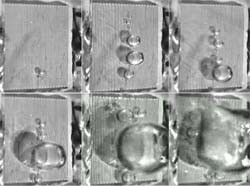
The opportunity to carry out experiments in the absence of gravity has always interested CAS scientists. Studies have been implemented via, for instance, Russian Mir Space Station and China's space flights ever since the establishment of the National Microgravity Laboratory (NML) at the CAS Institute of Mechanics (IMECH) in the late 1990s. In addition to concern about the effects of the weightlessness on humans sent into space, they are also interested in its effects on the reproductive and developmental cycles of plants and animals as well as other physical and chemical phenomena.
Of late, CAS scientists have scored rich results through a project entitled microgravity research platform onboard orbital module of seeding satellite, which was spoken highly by a panel of experts at an appraisal meeting held on 9 December in Beijing.
Headed by Prof. HU Wenrui, NML director and leading scientist in charging of the experiment, researchers successfully conducted a number of scientific experiments in a microgravity environment onboard the orbiter capsule of the Shijian-8, a Chinese scientific satellite launched on Sept. 9, 2006. Important results have already been attained from the 18 day experiment in the orbital capsule.
The major component of the microgravity experiment included: studies on accelerometers, smoldering, pool boiling heat transfer, diffusion coefficients, motion behaviors of granular matter, the impact of space environment on the embryonic development of transgenic stem cells, the growth of higher plants in a closed environmental system in space, and surface oscillation and volume effects of thermocapillary convection.
This experiments involved researchers from a number of CAS institutes (such as IMECH, Institute of Physics, Institute of Zoology, Shanghai Institute of Plant and Ecology, Institute of Engineering Thermophysics, Shanghai Institute of Technical Physics, Academy of Opto-electronics) and Huazhong University of Science and Technology.
The renovation of the orbiter capsule was made with the backing of several governmental departments, including the State Commission for Science, Technology and Industry for National Defense, the National Development and Reform Commission and Ministry of Finance. CAS rendered support to the scientific research, equipment development, overall coordination, tests in space, data receiving and processing of the project. The overall coordination is carried out by the CAS Institute of Mechanics and the General Establishment of Space Science and Application under the CAS Academy of Opto-electronics.







